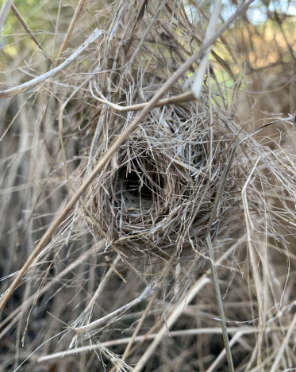Gardeners at RHS Garden Hyde Hall in Essex have discovered harvest mice nests in their borders, a sure sign that there is a breeding population of the tiny mice in the garden.
Harvest mice are the smallest rodent in the UK, weighing in at about five grams, equivalent to a two pence piece. The mice use their long tails as an extra limb, helping them climb up vegetation in their favoured habitat of grasslands, reedbeds and hedgerows. They build their nests within the vegetation, creating dense balls of tightly woven strands of grasses and reeds. Due to their small size and secretive habits, populations of harvest mice are often only known through records of their nests, which become more visible in autumn once vegetation dies back. The mice are a UK Biodiversity Action Plan (BAP) priority species.
At RHS Garden Hyde Hall the first evidence of harvest mice in the cultivated areas of the garden was found within the borders at Clover Hill, when gardeners discovered the nests while cutting back grasses over winter. Clover Hill has large borders, covered in swathes of ornamental grasses and herbaceous perennials, including Calamagrostis, Molinia and Anamanthele. Harvest mice do not use their nests over winter and will build a new nest each spring. In total the garden team have found eight nests, indicating there may be a growing population at Hyde Hall.
Sarah Wilson-Frost, Horticulturist at RHS Garden Hyde Hall, said: “I was thrilled to find the harvest mice nests over winter, and we are still finding them as we move into spring. We have been able to make changes to the management of the beds to help the mice survive cold winters. Rather than removing the ornamental grasses, we are now shredding the material and leaving it on the beds, creating more habitat for invertebrates and overwintering areas for small mammals. This also has the added benefit of improving the soil as nutrients are added as the shredded material rots down. We are also looking at ways to create wildlife corridors through the gardens so creatures can move around under cover.”
Gemma Golding, RHS Senior Ecologist, added: “It was very exciting to hear that Hyde Hall have found a new species in the garden, and this addition helps show how important garden habitats can be in boosting biodiversity across the UK. Gardens are an important extension of native habitats, and as Hyde Hall is surrounded by farmland it is likely the mice will have come from there and found suitable food and living space in the garden.”




